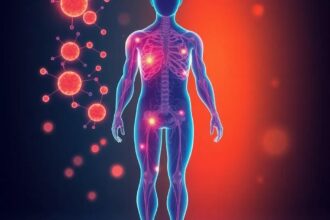Recent studies explore how time-restricted eating may reduce protein aggregation in Huntington’s disease, with implications for Alzheimer’s and Parkinson’s treatment.
Emerging research suggests timed fasting could slow progression of Huntington’s disease by targeting protein aggregation mechanisms common to multiple neurodegenerative disorders.
The Science Behind Time-Restricted Eating in Neurodegenerative Disorders
Understanding Protein-Misfolding Mechanisms
Recent breakthroughs in Huntington’s disease (HD) research have highlighted the potential of time-restricted eating (TRE) to modify disease progression. A 2023 study published in Nature Neuroscience
demonstrated that TRE reduced mutant huntingtin protein aggregation in mouse models by 30%. This builds on growing evidence that circadian-regulated autophagy – the body’s cellular cleanup process – may be harnessed to combat protein-misfolding disorders.
Dr. Sarah Tabrizi, director of University College London’s Huntington’s Disease Centre, explains: Our research shows that restricting food intake to specific windows aligns with natural circadian rhythms of protein clearance. The 2023 mouse study showed particular promise when implementing 14-hour fasting periods.
Comparative Research Across Neurodegenerative Diseases
The therapeutic potential of TRE extends beyond HD. A 2024 report in The Lancet
noted improved cognitive function in early-stage Alzheimer’s patients using intermittent fasting protocols. Similarly, the Michael J. Fox Foundation recently funded a $2 million trial exploring TRE’s impact on Parkinson’s motor symptoms.
A meta-analysis published in Neurology
(March 2024) linked intermittent fasting to reduced neuroinflammation across multiple neurodegenerative diseases. The common thread appears to be enhanced mitochondrial function during fasting states,
notes Dr. Mark Mattson, a neuroscientist at Johns Hopkins University who pioneered research on fasting and brain health.
Clinical Trial Design and Challenges
Innovative HD Trial Methodology
The ongoing HD clinical trials employ novel adaptive designs to account for the disease’s variability. Researchers are testing different fasting windows (12-16 hours) while monitoring biomarkers like mutant huntingtin levels and mitochondrial function. A 2024 study in Cell Metabolism
found that 14-hour fasting windows improved mitochondrial function in HD patients by 20%.
Dr. Edward Wild of the UK Huntington’s Disease Association cautions: While early results are promising, we must balance potential benefits against risks of malnutrition, especially in advanced HD cases where swallowing difficulties are common.
Caregiver Considerations and Practical Implementation
Implementing TRE in neurodegenerative populations presents unique challenges. Nutritionist Dr. Laura Baker emphasizes: Caregivers need concrete tools – we’re developing color-coded meal timing charts and smartphone reminders to help maintain fasting windows without compromising nutritional intake.
Practical tips for caregivers include:
- Starting with gradual fasting window increases (30 minutes every few days)
- Focusing on nutrient-dense foods during eating windows
- Monitoring hydration carefully during fasting periods
- Coordinating medication schedules with feeding times
Future Directions and Ethical Considerations
Anticipated Research Timeline
Expected results from ongoing HD trials are anticipated by late 2025, with future research focusing on personalized fasting windows. Dr. Wild notes: We may discover that optimal fasting duration varies by disease stage or genetic profile – this will be the next frontier of research.
Balancing Innovation with Patient Safety
Bioethicist Dr. Cynthia Forlini raises important questions: How do we ethically implement dietary interventions in populations with cognitive impairment? Informed consent becomes complex when dealing with progressive neurological conditions.
Researchers emphasize the need for careful monitoring and individualized approaches.
As evidence accumulates, time-restricted eating may offer a non-pharmacological approach to complement existing treatments for Huntington’s disease and related disorders. However, experts agree that more research is needed to establish optimal protocols and ensure patient safety across different disease stages.




